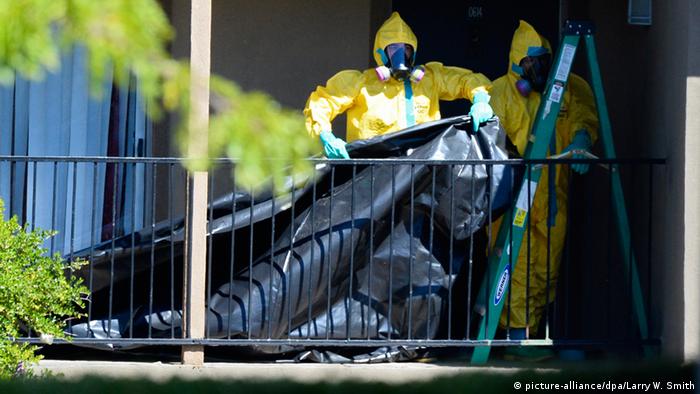EBOLA VIRUS
Opinion: Ebola's not something you can insure yourself against
People in Africa are dying by the thousands and proper burials are impossible. But in Europe and the US, we're panicking over a handful of cases. DW's Volker Wagener asks if we've lost our minds.
Ebola is like climate change. The floods and droughts that are its result kill thousands in places like Bangladesh or Australia, while in Germany, there's panic.
The things that actually affect far-away countries fuel our fears. Disasters in Africa or Asia hit a nerve with us. It's our fear for our existence - German angst. We feel deeply sorry for the fate of these other people, then we overreact when it comes to our own wellbeing. Because we somehow want to have control over things, and we'll do almost anything to get it. We're over-insured, our average age is increasing, we retire early and we "shape" our lives. We're branded by the "no-claims" mentality. If we could, we'd take out insurance against death by Ebola. It's pretty paranoid.
Disease control: the Americans' Achilles' heel
Even the great United States has discovered a new enemy. When it comes to Ebola, the Americans are at a loss. In the land of unlimited opportunity, every drugstore in every Alaskan outpost is likely to keep a stock of rattlesnake anti-venom. In comparison, US bureaucracy is helpless in the face of an epidemic - or at least, headless. Despite extensive warnings by the Centers for Disease Control and Prevention, a Dallas clinic sent home a Liberian man with a fever. The man then infected one of the nurses who treated him.
In another case, authorities allowed a woman infected with Ebola to board a flight from Cleveland to Dallas along with 132 other passengers. This is not what professional handling of a deadly disease looks like. It's no wonder, then, that more than a quarter of Americans say they are afraid of the virus. On Twitter, all hell has broken loose. "Ebola is here!" reads one tweet, in way that sounds as if Bin Laden had risen from the dead.
Of course, the fear in the so-called First World has many rational causes. The sort of dilettantish circumstances that surrounded the flight of the Ebola patient to Dallas could, in the worst case, bring the United States the exact thing that has turned the sickness into a catastrophe for West Africa: exponential spread of a deadly virus.
Loss of control spurs fear
But it doesn't have to come to that. The most effective weapons against Ebola are knowledge about hygiene and infectious diseases, protective clothing and common sense, doctors say. And these are things that we have in the West! Well, maybe common sense doesn't always prevail. The prosperous people of Europe and the US are known for their fear of the unknown, after all, and that can result in strange paradoxes.
Year after year, in wealthy Germany with its excellent health care system, thousands of people die from flu because they didn't get immunized against it. And in the 21st century, you still find adults dying of long-forgotten childhood diseases such as mumps and measles because of missed - or refused - vaccinations. At the same time, widespread forms of illness such as heart disease, stroke or alcoholism tend not to alarm us anymore; they are the results of living the good life, which we so hate to restrict.
But Ebola? That's shocking. Because it comes from "abroad," because there's no treatment for it, because it delivers such terrible news from Africa each day. But no one thinks to take sensible action like making a donation to the organizations that help African countries fight Ebola. Instead we worry about ourselves because it's much easier. But in light of what is happening in West Africa, it's also unspeakably jaded. DW DE



No comments:
Post a Comment